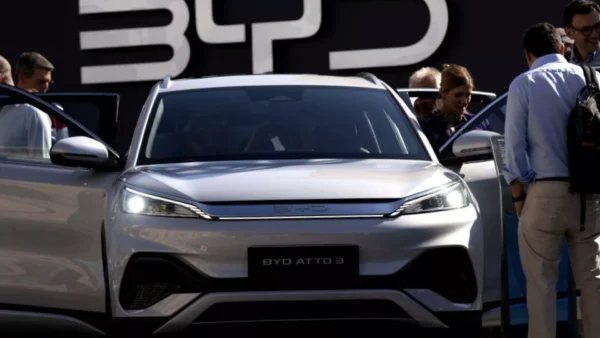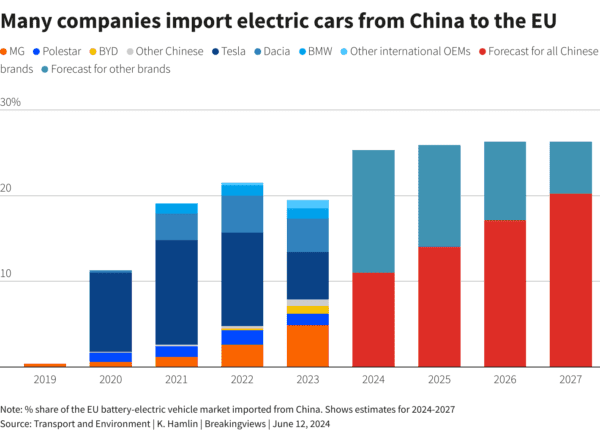On October 4th, the European Union passed a tariff of up to 45%, after a divided vote, against Chinese electric vehicles. The decision was foreshadowed back in June, but only recently was it put into practice after a poll that showcased Europe’s disunity.
The European Commission has stated that the tariffs are meant to combat “unfair” Chinese subsidies in the industry after a year-long investigation on the matter. They were backed by 10 member states compared to the 5 votes against, with 12 abstentions. Reuters predicted the outcome, highlighting the importance of France, Italy, and Poland’s support. France’s PFA car organization praised the tariffs, saying they are in favor of free trade as long as they remain fair. China’s probes into EU imports of brandy, dairy, and pork products were also taken into account as a justification for such a move.

BYD’s tariff will remain constant at 17%, Matthias Schrader from Euronews.
However, the largest economy in the EU, Germany rejected the idea of such tariffs before they were passed. The German Automotive Industry Association called the vote a “further step away from global cooperation”. Carmakers expressed similar sentiments, with the CEO of BMW labeling them as a “fatal signal for the European automotive industry” and Mercedes warning that the Union was making “a mistake that could lead to severe negative consequences.” However, some European carmakers such as Renault and Volkswagen saw their shares rise following the news with fresh hopes that their competitiveness will rise with the decreased Chinese presence in the EV market.
The EU remains on the fence about alternative solutions, claiming that other remedies could be agreed upon with Beijing. Namely, minimum import prices and volume caps are being considered. This, however, stands on thin ice due to fear of possible retaliation from China that could see other solutions evaporate, according to a senior adviser at Rhodium Group. Viktor Orban warned of an “economic Cold War with China”. The Chinese commerce industry complained to the World Trade Organization, expressing a stance that portrayed the tariffs as a violation of the organization’s rules.
Varying levels of additional import costs are employed depending on the company’s relationship with the EU:
Producers that participated in the investigation but had not been individually sampled: 20.7%
Producers that did not cooperate: 35.3%
Tesla: 7.8%
BYD: 17%
Geely: 18.8%
SAIC: 35.3%

EV imports to the EU courtesy of Reuters.
All of these come on top of the standard 10% tariff the EU has in place for cars, meaning that companies unwilling to cooperate can face tariffs of up to 45.3%. Billions in additional costs will be felt by carmakers throughout Europe from October 31st for the next five years.
Apart from increased economic costs, the tariffs could lead to higher EV prices throughout the continent, undermining the carbon emission reduction goals.
Europe became the main destination for Chinese EVs once both the United States and Canada imposed 100% levies on the industry. With North America no longer such a viable market, Chinese EV companies turned their attention to the next best alternative, but those relations are changing course at this time.
With trade tensions increasing, the European Union and China are fast approaching a scenario of economic warfare from which no side could come out as a winner.
Featured image: Chinese cargo on a map of Europe, courtesy of Forbes.







